|
Meet Kasper! He loves to be the center of attention and is a HUGE lover of biscuits, using sign language about 50 times a day to ask for it. He has achieved so many accomplishments recently, like using babbling to communicate and improving his sleep after sleep training! To learn more about Kasper's seizure journey, his love for books, and more, read the interview conducted with Kasper's family down below.
1. To start off, can you tell me a little bit about Kasper? Kasper (aka Kasper Bear!) is now 2 and a half. He was diagnosed with infantile spasms in March 2020 at 9 months old and was quickly put on anti-seizure medication. In hindsight, there were signs that Kasper was different very early on. He had colic, digestive issues, reflux (stomach acid irritating the stomach lining), and poor sleep from being a newborn. When Kasper was around 6 months old we became concerned when he began missing milestones. At 9 months old he was also diagnosed with hypotonia and GDD. After many tests such as an MRI, 3 rounds of metabolic tests, and two rounds of genetic testing, we finally got his diagnosis this past August of DeSanto-Shinawi syndrome, which is a newly discovered genetic disorder characterized by developmental delay, hypotonia, behavioral problems, intellectual disability, feeding difficulty, and seizures. It was a relief to have a name and a community to connect with. Reading the symptoms was like reading all about Kasper; suddenly everything fit and made sense. There were even things like the poor sleep, digestive issues and unusual facial features that we hadn’t realized could be related to a syndrome. 2. What would surprise people the most about Kasper? He’s now a great sleeper! After sleep training and weaning off anti-seizure medication, he has now settled into a much better sleeper. It’s a far cry from when he woke every 45 minutes all night every night for months. 3. What does Kasper love to do? What is his personality like? Kasper loves swings! He would spend all day in a swing if he could. He also loves books and he’ll bring you his favorite books to read to him. He loves food, especially cake and biscuits. Now he can sign for biscuits, he signs it about 50 times a day! He’s very cheeky and all the therapists call him that. He has also recently become a little show-off and likes to show off his latest tricks. He loves to be the centre of attention and can become very whiny when he’s not! 4. What are some of Kasper's best strengths? He’s very determined. If he wants something, he’s going to make sure he gets it! He’s also extremely stubborn and won’t do anything he doesn’t want to do. He’s creative too. He likes to experiment with toys and try different things out. 5. What is a recent accomplishment/milestone of Kasper? He’s starting to direct his babbling and use Makaton signs (a form of sign language) to communicate. 6. What has Kasper taught you? That having a disabled child is not as terrifying and terrible as we once thought. I’m glad we don’t feel like that anymore. There have been some really tough times but we now see our lives as full of love and adventure. 7. What is your mission as an advocate for Kasper? To raise awareness of infantile spasms and DeSanto-Shinawi syndrome and also support parents who are at the beginning of their journey. 8. What resources have been helpful in your journey as Kasper's parent? Facebook support groups such as: The Hypotonia Parent Support Group, UK Infantile Spasms Trust Support Group (West Syndrome), and Parents of Children with Rare Conditions Books: Raising a Rare Girl by Heather Lanier and Special by Melanie Dimmitt Podcasts: The Mama Bear podcast by Mary Susan McConnell, Once Upon a Gene by Effie Parks, The Rare Life by Madeline Cheney, and One in a Million Baby by Tessa Prebble Websites: https://ukinfantilespasmstrust.org/ and https://de.dessh.org/ 9. What is the most rewarding aspect of raising Kasper? The fact that every achievement or milestone he hits is not taken for granted. We celebrate every win because we know how hard he has worked to get there. 10. What message/advice would you like to give other families who have a child/children with special needs? It can feel really lonely as a parent of a child with special needs but you are not alone. The internet has connected us with families all over the world and some of our closest friends now are some of the wonderful people who supported us throughout the really dark days of Kasper’s infantile spasms diagnosis. Use the internet to find people who get it even if their children don’t have exactly the same diagnosis.
0 Comments
Meet Nevaeh! She is truly the kindest (yet sassiest) little girl you would ever meet, and has won the "caring pillar of character" award from school many times. She has been working so hard to participate and pay attention in school which has been difficult because of virtual classes, and her parents are so beyond proud of her! To learn more about Nevaeh's San Filippo journey, her love for dress-up, and more, read the interview conducted with Nevaeh's parents down below.
1. To start off, can you tell me a little bit about your daughter Nevaeh? Ever since Nevaeh was little, she would rarely sleep, but she had so much energy all the time and was always moving around! This as well as her enlarged liver and spleen, her multiple ear infections, and speech delays led us to visit many doctor's offices. Even though we were told that Nevaeh had global delays and hearing impairments, she did not receive an official diagnosis until she was 6 years old. Trying our best to accommodate to Nevaeh's needs, we went to multiple speech and behavior therapies, had tubes fixed in her ears to help with her hearing, and tried to find methods for her to learn. Finally after running countless genetic tests, the doctors received Nevaeh's official diagnosis in October 2018: San Filippo syndrome. San Filippo Syndrome, also known as a type of childhood dementia, causes brain differences and is a rare genetic condition which makes it difficult for Nevaeh to break down certain sugars. While there are definitely hard days where many tears are shed, we just take each day as it comes and remain hopeful for treatment options to become available for us in the future. Nevaeh has taught me that I have more strength and patience than I realized, and no matter what life throws our way we try not to get overwhelmed and focus on living in the moment. 2. What is your mission as an advocate for Nevaeh? My mission is to spread awareness and get Nevaeh's name out there so that others can notice the signs and symptoms of San Filippo earlier. Even though San Filippo has no cure, finding out sooner can open more doors for clinical trials and helpful therapies. 3. What are Nevaeh's hobbies? She has regressed a lot since Covid hit and currently does virtual school for the sake of her health. However, through it all, she has kept such a bubbly personality, especially through singing and dancing! We always call Nevaeh a sour patch kid - she would be so sweet one moment, be a tad bit sassy or "sour" the next, and then be nice again! Even though Nevaeh relapsed, she still shows her sass and bubbly personality without words, like through facial expressions. She also gives the BEST hugs :) 4. What are Nevaeh's best qualities? Before regression, her best strength was her caring heart. She cared for everyone and if someone got hurt she would try to comfort them by giving them a bandaid or ice or whatever they needed to feel better. She always received the “caring pillar of character” award at school for her kind heart. 5. You briefly mentioned how Nevaeh had regressed due to COVID-19. What have been some of Nevaeh's biggest accomplishments before and after her regression? What challenges has there been dealing with the regression? Before regression, Nevaeh's biggest accomplishments were being able to talk with full sentences, coloring, writing, and memorizing shows and songs. Since regression, Nevaeh has accomplished being active at school and not hitting or biting (we really had to work hard on this one!). But honestly, any small accomplishment is a big accomplishment because not all kids with San Filippo are able to do the same things. It truly affects every kid differently. 6. What resources have been helpful as Nevaeh's parent? Support groups on social media like Facebook, Instagram, and TikTok have been a huge help. Finding other families that have gone through this journey and can share experiences or advice with has truly been a lifesaver. Also the therapies! Without the speech, behavior, physical and occupational therapies, I honestly don’t think my daughter would have achieved as many goals as she would have without them. Also, having doctors that work tirelessly to find answers and be willing to hear you and cry with you at appointments makes you realize there are doctors that truly care about their patients and don’t see them as just a number or paycheck. 7. What message would you like to give other families who have a neurodiverse child? I would say to take each day as it comes. Take lots of pictures and videos so you can look back on them later. Try not to focus so much on the inevitable or you will miss all the moments happening right now. Treasure each moment. Don’t let their disability stop them from living life. Take them to the beach, out to eat, and traveling, even when the road ahead seems daunting. 8. What do you love most about raising Nevaeh? The most rewarding part of raising Nevaeh is how much fun she can be and how loving she is. She truly picks me up on my down days. I love when she would put on little shoes for me, or when we would have sing along to movies and play dress up. Her smile and hugs literally heal all wounds. When I stop to think about the future and life without her, she always knows somehow that I need a hug or a smile. Meet Josie! This superstar can be found enjoying aquatic therapy, giving hugs to anyone and everyone that comes her way, and is a lover of tickles. Josie recently made HUGE accomplishments with communication, making happy noises when she is happy and angry noises when she is upset. To learn more about Josie's seizure journey, the amazing support system Josie's family receives from Facebook, and more, read the interview conducted with Josie's family down below!
1. To start off, can you tell me a little bit about Josie? Josie is our sweet four year old girl and has Leigh Syndrome, which leads to the degeneration of the central nervous system (makes up the brain, spinal cords, and optic nerve). Josie was diagnosed with auditory neuropathy spectrum disorder (ANSD) at birth and a few month later, while hospitalized for debilitating seizures, she was diagnosed with Leigh’s. The news was devastating to our family and we brought her home after being told she’d be lucky to see her first birthday. Leigh Syndrome is a rare form of mitochondrial disease which affects all aspects of Josie’s life. She has to use supplemental oxygen, is fed through a g-tube, and cannot sit by herself. She still has seizures, and she has both hearing and vision impairments. However, Josie is a fighter! After beating her initial prognosis, she has continued to make huge strides. She learned to smile again, has the most beautiful grins, and recently learned to roll over on her own, which is something we've been working on for quite a while! She also loves playing in the water and looks forward to going to her weekly aquatic therapy, which helps Josie move more with less pain and pressure on her joints and muscles. 2. What do you love most about raising Josie? Seeing her change and grow. The most rewarding part of being a parent is seeing the person your child becomes, but it's even more so when that child has such challenges on them. The first time Josie rolled over we practically threw a party! When Josie was first diagnosed, she lost the ability to smile, but when we first started getting small smiles, we were beyond excited. Now she full on laughs, but every time she smiles is a miracle to me. 3. What would surprise people the most about Josie? How much Josie truly understands. She is nonverbal, but she very clearly knows what she wants and has her own unique ways of communicating. She knows when it's the end of the day and when it's bath time. She knows when her sisters are nearby and she will turn to them and want them close. She has what we call her "listening eyes." It's a specific look Josie will get on her face when she is paying close attention to her surroundings. 4. What characteristic of Josie do you love most? Her determination. She goes to multiple therapies every week to help with her motor skills and teach her to communicate. She has had so many hard hits in her life, and her illness makes it hard for her to do pretty much anything. However, Josie hits every challenge head-on and surprises all of us! She learned to roll over (something we thought she would never do), is learning how to sit on her own, and is working on making choices with the help of a switch. She has a sign in her room that says "This Girl Can" and she truly encompasses that phrase. 5. You previously mentioned that Josie has improved a lot with interacting with others. Can you elaborate further on Josie's communication milestones? Previously, the only way we could really understand what Josie wanted would be to read her body language. This year she has learned how to use a switch to operate a toy consistently. She has also learned how to ask for more playtime by reaching up and touching our faces and will make very obvious happy noises (like laughing or giggling) when she is happy and very obvious angry noises when she's upset. Now we are working on making choices in school and in her daily living activities. She is learning to be more in control of her environment and it's truly opening up a whole new world for her! 6. What does Josie love to do? Josie is a sweet, easy-going kid. She loves being with her family, being held, and being tickled. She loves any kind of physical play that gives her vestibular input, meaning things that move the fluid in the inner ear. She loves being held in your arms and being tipped over so her head is close to the floor. She will ask to repeat this game by tapping your cheek with her hand. She loves being spun around in circles in your arms or in her Special Tomato chair (a special needs seating system). She would love rollercoasters if she were able to be safely held in one. Josie also loves anything to do with water. Bath time is her favorite time of day and in the summer she is happiest when she's swimming in the pool. Recently, we discovered that the sound of bells or chimes make her laugh! 7. What have been some of the most helpful organizations and outlets guiding you through your daughter's journey with Leigh Syndrome? I am in a number of Facebook groups for parents of kids with Leigh Syndrome or kids with special needs. Being in those communities is beyond comforting not only for advice but also as a support system to lean on when faced with obstacles. When Josie was diagnosed, I had never even heard of Leigh Syndrome. Those first few months were terrifying and isolating, but finding this online community of parents who have been there and shared their experiences with us has been amazing. That's one of the reasons why I started Josie's Instagram page. I wanted to share her journey with other people and hopefully help another child or parent. Meet Abby! You can find her hard at work on her modified treadmill or counting all her Disney Princess Little People toys. Abby is also amazing at sign language, and has learned over 200 signs so far at just 2 years old! To learn more about Abby and her speech therapist teaching Abby's Pre-K 2 year old class sign language, Abby's love for traveling (Ireland 3 times and 6 US states so far!), and more, read the interview conducted with Abby's father down below.
1. To start off, can you tell me a little bit about Abby? Abigail "Abby" Szostek is the dynamic, energetic, terrific two year daughter of Vicki and Dan Szostek from Norristown, PA. Abby is truly proof that there is nothing "down" about Down syndrome! To set the record straight, Abby does not “suffer from Down syndrome.” No one with Down syndrome actually suffers from it. Down syndrome is a genetic condition where an individual has an extra copy of chromosome 21. This extra copy changes how Abby’s body and brain develop, which can cause both mental and physical challenges. About three months before her birth it was discovered that Abby had a congenital defect of her digestive tract called Duodenal Atresia, also known as a “double bubble.” This condition has a high association rate with Down syndrome and would require surgery shortly after birth. In addition, the Noninvasive prenatal testing (NIPT) done about 5 months before she was born also showed a high risk for Down syndrome. This was certainly a lot for us to process, We were absolutely overjoyed that our daughter was on her way to our arms but we knew it was going to be a long, worrisome road ahead. On December 10th 2018 the world welcomed our “Amazing Abby” weighing in at just 3 pounds. After a quick visit with Mom & Dad in the recovery room, Abby was taken downstairs to the NICU at the Children’s Hospital of Philadelphia (CHOP). This became our home for the next 78 days. Much of that time was spent waiting for Abby to gain enough weight for surgery and for her to work through some breathing issues. Once Abby was discharged from the NICU on February 25, 2019 our life as a family at home finally began. We were absolutely thrilled! The weeks that followed were filled with medical appointments and meetings to arrange Abby’s Early Intervention therapy sessions. About four months after she was born, Abby began both physical and speech therapy. As the months passed, additional therapy services were added to help Abby with her development. Abby was certainly thriving with all the services she was receiving. She was also on her way to becoming a well seasoned traveler both internationally and domestic. By her second birthday, Abby had traveled to Ireland 3 times and visited 6 US States. Our journey with Abby brings excitement and joy everyday. But honestly there are also fears and uncertainties. Usually those worries fade away with just a few giggles from our “Amazing Abby.” We truly believe our family and friends are very blessed to have Abby in our lives. She will teach us so much more about life and love and we are lucky to be on this path with her. 2. What does Abby love to do? What is her personality like? Abby is certainly an outgoing personality. She loves to wave “Hello” whenever we go out and her smile, when she isn’t wearing a mask, totally brightens up any room. Now that we are getting together more often with family and friends, Abby’s favorite group activity is pointing to everyone in the room to learn their names. Most days Abby can be found on her treadmill watching Sesame Street or rocking out in the kitchen dancing to all kinds of tunes courtesy of “DJ Alexa.” When she’s not showing off her athletic abilities you can find her with her nose in a book or setting up and counting all her Disney Princess Little People toys. 3. What would surprise people the most about Abby? One thing that might surprise people about Abby is that she walks on a modified treadmill for about 30 minutes each day! When Abby was between standing and walking and starting her cruising phase, her Children’s Hospital Physical Therapist suggested starting Treadmill Training with Abby. “What wait?!?” I thought to myself. Did I hear that right? 1 year old on a treadmill? She explained how children with Down syndrome because of their low muscle tone typically start walking a year or two later than typical children. There was evidence that with training and support, treadmill training helped infants with Down syndrome learn to walk earlier than they normally would. So we went “all in” as they say and configured our home treadmill for Abby’s use. We started the training in April and by October Abby’s was taking unaided steps around the kitchen. It was an amazing milestone for us to witness. Even though she is a full on walker/runner now, we continue to use the treadmill with Abby on a weekly basis to continue the progress we’ve made. But, our focus has now shifted to Abby’s speech. She is currently nonverbal and recently given a diagnosis of Apraxia of speech, which is an impaired ability to perform speech movements. We always joke that if only there was some type of speech production activity equivalent to treadmill training :). But we are hopeful that just as Abby began to walk on her own her speech will follow. 4. What is a recent accomplishment/milestone of Abby? Most recently, Abby started a PreK 2 year old program at a local Catholic School. Her teacher and the therapists that accompany Abby to school say she is doing great and having fun dancing along to songs and listening in on story time. Abby and her speech therapist are actually helping her class to learn sign language as well! 5. What are some of Abby's best strengths? Multiple medical professionals and therapists have told us that Abby’s receptive language is incredible. She amazes us on a daily basis. One clear example is watching Abby interact with her music therapist. Every Tuesday and Thursday morning Abby attends a virtual music class. The way she picks up the actions and the rhythm of all the songs is fascinating. Another strength to mention is that Abby knows over 200 signs! We have been teaching her baby sign language very early and by 18 months she knew about 20 signs. My wife & I have really enjoyed learning sign language with the help of our Early Intervention therapist & numerous ASL YouTubers. Signing has not only helped Abby communicate with us, but it has also allowed her to interact with others. But perhaps her greatest strength is the amazing healing power of her hugs and her laughter. 6. What is your mission as an advocate for Abby? We envision a life for Abby where she will be accepted, admired, and loved. We will always advocate for her to have access to healthcare and developmental opportunities. We will also support her to challenge the assumptions of others. 7. What has Abby taught you? Patience. Definitely patience. She has also taught us that it’s perfectly okay to have a sink full of dirty dishes, multiple baskets full of dirty laundry, and a screen door covered in fingerprints because time is better spent playing princesses, watching ‘Moana’ for the hundredth time, blowing bubbles, or just being silly. 8. What resources have been helpful for you on your journey? Perhaps the most amazing resource we have found on our journey has been the Montgomery County Down Syndrome Interest Group (MCDSIG). This village welcomed us with open arms and offered plenty of support during our 78 day NICU stay when Abby was born. Their support continues to this day. We have been so appreciative for the insight, care & generosity this community has shown to us. The Trisomy 21 Clinic at the Children’s Hospital of Philadelphia (CHOP) has been a great resource connecting us with physicians and therapists. For the past 2 years we have participated in the CHOP Buddy Walk that supports the work of the T21 program. The Walk is a wonderful event that brings together friends and family of our local Down syndrome community. We owe much of Abby’s developmental successes to her Early Intervention and CHOP Therapists. Abby participates in 5 different therapies which include speech, occupational, special instruction, and music. Lastly, both of us have found online support groups like the Down Syndrome Diagnosis Network (DSDN) to be extremely helpful. Connecting and sharing with other parents not only throughout the country but around the world has been another wonderful level of support on this journey. 9. What is the most rewarding aspect of raising Abby? I think one rewarding aspect of raising Abby has been the introduction to all the amazing “Mama & Papa Bears” in the Down syndrome community. The way we lift each other up during tough days and the way we celebrate milestones is something special. But the most rewarding aspect of raising Abby is hearing her giggles everyday. 10. What message/advice would you like to give other families who have a child/children with special needs? Don't sweat the “not yets.” Right now, Abby is “not yet” speaking; however, she is babbling up a storm and works so hard with her speech therapists. We know she will speak but it’s just going to happen on her own schedule. Without a doubt the “not yets” hit really hard some days. You’ll see other kids similar in age to your kiddo who are functioning at higher levels. You’ll feel that lump forming in the back of your throat, you’ll hold back some tears and begin asking yourself “Why?” In those moments it’s best to take a deep breath, step back and remember our kids march to their own beat and set their own schedules. They also give the BEST hugs. Meet Macie! She loves swinging on adaptive swings, and if she could, she would swing all day long! This past January, Macie took her first steps using a gait trailer, and her family and friends are SO proud of her! To learn more about Macie's love for yoga, her mother's favorite organization providing free refurbished adaptive equipment, and more, read the interview conducted with Macie's family down below. 1. To start off, can you tell me a little bit about Macie? Macie is 8 years old and at 6 months she was diagnosed with Spastic Quad cerebral palsy, which is a form of cerebral palsy leading her to lose sense of her whole body. She lost 70% of her blood at birth, which resulted in major damage to the left side of her brain. Macie is globally delayed; however, she is meeting milestones on her own terms! Just this past January, Macie took her first steps using a gait trainer, which is a wheeled device that helps her walk :) 2. What would surprise people the most about Macie? People who are less accepting of individuals with disabilities would be surprised that Macie is just like any other 8 year old girl! She loves to play outside, walk to the park, swing on adaptive swings, play with dolls and her toy kitchen, and practice yoga. Macie is truly more alike than different from everyone else. It's so important for other people to realize that and treat her with the same kindness as they do with everyone else. She just does things a bit differently, and that is perfectly okay! Macie can make anyone smile and is determined to conquer the world in her own ways. 3. How do you strive to be Macie's advocate? My mission as Macie's advocate is to create a more aware and accepting environment for Macie as well as other people with disabilities. Although they may have their differences, they deserve the same belonging as everyone else! I also hope to educate people about disabilities and different assistive tools like feeding tubes through platforms like Instagram. 4. What do you love most being Macie's parent? Macie taught me the importance of celebrating all accomplishments no matter its size. Watching her work so hard on her goals with walking, seeing her smile, and being so proud of herself makes my day! 5. What have been the most important lessons that Macie taught you? My daughter has taught me that no matter what challenges we face in life, if we have a positive attitude and determination, we can conquer anything. It's essential to get out of our comfort zone and to be comfortable asking for help. This is a journey we can't do by ourselves, so taking the initiative to seek out resources is so important! 6. What are some of the most helpful resources that Macie uses? One of my favorite resources for Macie is the Children's Assistive Technology Service (https://hr.atdevicesforkids.org/), which is an organization based in Virginia that refurbishes adaptive equipment and gives it to special needs families at no cost. 7. Before we end our interview today, is there any advice you would like to share with other families who have a child with special needs? Take life one day at a time, give yourself credit for the work that you are doing, and give yourself some grace. Hard days are bound to happen, but you will get through them. Your child having a disability will change your life for the better - you just have to be open and accepting. Take the time to celebrate all the accomplishments, no matter how little. Meet Reed! He is truly the definition of a superstar, always being an amazing big brother to his little sister Ruby. He recently accomplished an amazing milestone - having the strength to reach and turn a doorknob! For having weaknesses in the wrists, the turning motion can be challenging for Reed so his family is VERY proud of him! To learn more about the weekly infusions Reed takes and his love for the Beatles, read the interview conducted with his mother below.
1. To start off, can you tell me a little bit about Reed? Reed is 4 years old, and he was diagnosed with Morquio A syndrome last year shortly after his sister Ruby was born in the middle of the pandemic. Reed has always been petite and after many specialist appointments and dead ends, his endocrinologist requested a skeletal survey, which are x rays of every bone in his body. These were all abnormal and we were immediately referred to the geneticist. We were expecting that something would be off, but not to the degree at which Morquio does and will continue to affect him. Reed lacks the enzyme he needs to break down certain sugar molecules in his body called glycosaminosglycosans. These molecules then ultimately attack all of his organ systems, mostly affecting his skeletal system. He receives a weekly infusion of Vimizim, a synthetic version of this enzyme. Unfortunately, this only prevents him from getting worse, and there is no cure. Even through all the challenges, Reed always has a bright smile on his face! He is very much a rule follower, and learns and picks up things so quickly. Most of all, he loves trains, cars, and all types of music, especially the Beatles. He is also an amazing big brother and always takes care of his little sister Ruby. 2. What do you love most about raising Reed? Being his mother, I thought that I would give Reed life, but he truly gave me mine. His zest for life and personality are unmatched. I learn so much from him every day. 3. What are some of your favorite resources as a parent? Other moms of Morquio children I have met on Instagram have truly been an amazing resource. Whether I need advice or have any questions, they have always been an amazing support system. The MPS society and NORD (National Organization for Rare Diseases) have amazing resources as well for people like my son. 4. What is a recent accomplishment/milestone of Reed? Having the strength to reach for and turn the door knob! With Morquio, there can be weaknesses in the joints. For Reed, he has weakness in his wrists, so that turning motion can be challenging. Reed has been working so hard on improving his wrist movement and we are so proud of him! Reed is also very smart. He has the amazing ability to open a book he has never seen before and read the words on the page! 5. What has your son taught you? Reed has taught me so much about life, but mostly how important the simple things are. Every thing he does is like he is experiencing it for the first time. Watching Reed explore the world through his own unique way is truly my greatest joy. 6. What message/advice would you like to give other families who have a child/children with special needs? When your child is first diagnosed, it can often be a very confusing and isolating experience. My best advice is to build your support network and align yourselves with people and families who have similar experiences to you. The times I needed support the most were a long time after the diagnosis. Certain milestones and the anniversary of the diagnosis can be much harder. Meet Hailey! She can be found hanging out with her dog Bailey or watching her older brother Noah doing funny dance moves. Don't be fooled - while she may be shy at first, she will quickly warm up to you with her kind heart and contagious smile! To learn more about Hailey's diagnosis journey, her recent accomplishment of waving, and her mother's mission of Hailey writing her college essay on her cure in the future, read the interview down below.
1. To start off, can you tell me a little bit about Hailey? Hailey is a happy, sociable, 17-month old girl. She was born at the beginning of the pandemic, so she is making history simply by her mere being! Hailey is my second child, and I have a son named Noah who is four years old. Hailey was originally a twin, but we lost the other baby early on in pregnancy. From the start, Hailey has proven her strength and resiliency! She is a fighter and continues to be. From a medical standpoint, my pregnancy with Hailey continued to show a healthy developing child after genetic testing and routine ultrasounds. After her birth and a long journey of doctor visits (followed by my own concerns), Google searches, tears, and a misdiagnosis, Hailey was finally given a diagnosis at 8 months old. Her amazing neurologist did some more genetic testing and found out that she has Jordan's Syndrome, an extremely rare condition that currently has 191 other individuals diagnosed worldwide. Jordan's Syndrome is the outcome of a random mutation on the gene PPP2r5d. Individuals with Jordan's Syndrome struggle with hypotonia (low muscle tone), sleep disorders, seizure disorders, global developmental delays, etc. However, Hailey is MUCH more than her diagnosis! She has the cutest giggle that I have ever heard (aside from my son). She gets so much joy out of watching her big brother dance around a room or sing his favorite songs, but nothing gets her going like her dog, Bailey (yes their names rhyme- oops!). She cannot stop laughing when her dog gets one of her blankets and throws it around. Hailey is very attached to her doggy and brother and loves to watch them play and run around. 2. What is a recent accomplishment/milestone of Hailey? Hailey has started clapping and waves hi! She is so cute and proud of herself whenever she does that. Her accomplishment is usually followed by a big grin from ear to ear! 3. What is your mission as an advocate for Hailey? My mission started out as a means to help raise awareness for her rare condition and help fund ongoing research for Jordan’s Guardian Angels. While that is my main focus always, I have learned to advocate for her in so many different ways. My husband and I have made sure that when we feel something needs to be addressed by a medical professional, we push for it. My biggest mission is that one day, Hailey will be writing her college essay about how she was cured and how she would like to continue her education to help cure other unknown diseases, illnesses, etc. for the future. 4. What does Hailey love to do? What is her personality like? Hailey LOVES to people (and dog) watch. She soaks it all in and enjoys watching people in their element. She has become stronger due to all of her therapies, and she loves to sit (supported in her “sit-me-up” chair) and watch her friends and family do silly things. She has the sweetest disposition. It is rare that you will find her without a smile on her face. It may take her a little while to warm up to you, but once you have captured her interest, you will always have her heart! 5. What is the most rewarding aspect of raising Hailey? The most rewarding aspect of raising Hailey has been watching her grow into her own person. She is becoming the Hailey she wants to be and not what society deems is appropriate. Watching her thrive and master skills that she struggled with days, weeks, or even months ago, has been our greatest joy. Raising Hailey has allowed us to become more aware of the world and issues, people, and struggles that exist outside of our own bubble. 6. What are some of Hailey's best strengths? Hailey’s best strength is her resilience. There is not much that truly phases her. She has her MRI’s, EEG’s (even a take-home EEG's), dilated eyes, countless doctor appointments, and it takes a lot for her to get flustered or upset. Hailey is also one of the strongest individuals I know. It is not easy for her to do every day tasks (things like even lifting up her head or tummy time), but she works and pushes through it like a champ. She has been in therapy since about the age of 2 months and currently has therapies (physical, occupational, and speech/feeding) 8 times a week and counting. My favorite strength of hers, which I saved for last, is her ability to make everyone around her see the endless possibilities that are in her future. She helps shine light on what is so important in our world. 7. What has Hailey taught you? What hasn’t she taught me? Hailey has shown me a new world. She has allowed me to appreciate the small things in life. Because of her, I have slowed down, and truly taken the time to be so grateful for all of the blessings we have. Every time she hits a milestone (even if it isn’t a typical milestone) we celebrate it. We laugh, we cry, we make a big deal because Hailey is showing us that she is going at her own pace and getting to her destination in her own time. I am a parent to two children; Noah who is neurotypical, and Hailey who is neurodiverse. I have learned not to compare anyone (that goes beyond my children) and to allow people to express themselves however they want. 8. What resources have been helpful for you on your journey? Besides the community I have found in my fellow Jordan’s Angels families, I have found that people in my life, others in the rare disease community, and writing have been the most helpful resource for me. It has helped me cope, feel grief when I need to, find praise and support whenever, and has allowed me to feel less isolated and alone on this rare and unique journey. 9. What message/advice would you like to give other families who have a child/children with special needs? While no parent likes to hear that their child has struggles or may face a different path than we imagined, know that there is a community of people (even strangers) that are there for you. When you need to cry, cry. When you need to drive around in your car and scream so loud that you lose your voice for a few days, scream. And when you see progress in the things that you never thought would be achieved, cry, laugh, smile, celebrate. Just know that your feelings are valid, no matter how you feel. Meet Sarah! She has a huge heart, and one can always find her eating PB & J sandwiches, binge watching Disney movies, and playing dress-up with her little sister Veronica. She is very independent, and loves to learn how do tasks on her own. To learn more about her amazing accomplishments, her superpower to brighten strangers' days, and more, read the interview conducted with Sarah's parents below!
1. To start off, can you tell me a little bit about Sarah? Sarah is 8 years old as of March, and she was diagnosed officially with Apert syndrome after a genetic blood test at 2 weeks old. The doctors suspected Sarah had Apert, but we didn't know for sure until she saw a geneticist. Honestly, Sarah doesn't know life any differently, and she is such a normal kid in most ways! One example I can offer are her hands. Her fingers were fused at birth, much like a mitten. They were surgically separated in 3 separate surgeries from 9 months through 3 years of age. She does not have the capability of moving any of her knuckles, except the ones at the base of each finger. Her fingers are shaped differently, smaller than most kids her age; however, she has adapted beautifully to the use of her hands/fingers! As a baby, she learned to pick up blueberries not with the typical pincer grasp, but by using her first two digits. She can now write legibly, draw, color, cut with scissors, and do normal things that kids do with fine motor skills. This has been after 8 years of occupational therapists working with her! 2. What would surprise people the most about Sarah? Sarah is really a pretty typical 8 year old. She adores Minnie Mouse and loves Disney movies. Her favorite foods are bananas and PB & J sandwiches. She likes to play outside, ride her bike, go to the playground. She is imaginative with her younger sister, Veronica and they play dress-up or dolls. 3. What are some of Sarah's best strengths? Sarah is very independent. We see this as an asset, because she wants to learn how to do things on her own rather than relying on others for help all the time. She is friendly, smiles, and compliments people, cheering them up - even strangers! 4. What is Sarah's personality like? Her personality is very memorable! Sarah is boisterous, talkative, and has a HUGE heart. She cares about people and is very thoughtful. A few weeks ago, our daughter, Veronica, broke a very special ceramic butterfly that my father gave me when I was 10 after he came home from a business trip to Venezuela. Sarah recognized that I was very upset about it and she wrote me a note that said, "Dear Mom, I love you. I know you like butterflies and that you are sad because Veronica broke yours. Here is another one from me. Love, Sarah." She drew a butterfly next to her name. It was so characteristic of her personality. 5. What are some of your favorite Apert resources? There's an Apert group on Facebook that I've been a part of since Sarah's birth. Children's Craniofacial Association has also been very supportive of our family. 6. What is a recent accomplishment of Sarah? Since Sarah is on the autism spectrum, she does not readily recognize appropriate social cues or emotions. Recently, she said to me, "Mom, I get nervous when things change." This was a HUGE accomplishment, given that in the past she would have thrown fits and tantrums rather than expressing her feelings, and appropriate ones at that. I have to give credit to her phenomenal counselor, Heather Crow! 7. What is the most rewarding aspect of raising Sarah? Everyone tells me how Sarah warms their heart. I have had strangers tell me, "I really needed your daughter's smile today." When I stop and think about it, that is Sarah's gift - her ability to bring sunshine to people who are heavily burdened by life's worries. I could not be prouder of being Sarah's mother! 8. What message/advice would you like to give other families who have a child/children with special needs? Raising a child with special needs is a challenge. There's no question about it. We are jilted off our axes when we learn about a child's disability, because it thwarts the vision/ideal we had in mind for our child. The concept of raising a child who is so vastly different from us can be daunting. I can honestly say I have very very bad days, even weeks. But what keeps me going personally are the moments when I see hope, light, or love through Sarah's life. 9. What has your daughter taught you? To take life moment by moment, to appreciate the little things, and not to worry too much about complicated stresses. Meet Zariah! Although she may be small, she is definitely mighty and has made so many milestones recently! To learn more about Zariah's adoption story, her love for the song Some Things Never Change, and her family's mission to raise awareness, read the interview down below.
1. To start off, can you tell me a little bit about Zariah? Zariah is 1.5 years old, and was adopted on April 6th! She has schizencephaly which causes abnormal slits/clefts in the brain, arthrogryposis which is characterized by stiff joints, moebius syndrome which causes difficulty in controlling eye movements and facial expressions, cerebral palsy, has no function of her arms, laryngomalacia which affects her voice box, and is 100% g tube fed. However, while Zariah might be small, she is definitely mighty and captures all of our hearts! Zariah has been such a blessing in our lives and I cannot be prouder to be her mom. 2. What was your journey like with adopting Zariah? I'm a NICU nurse and I met Zariah February of last year. Her parents never visited, and it soon became clear that she was most likely going into foster care due to neglect. I really wanted to take Zariah home, but my husband was a little hesitant, especially since he never met her and he wasn't allowed to meet her until after we agreed to foster her. However, he finally did come around and said that he thought we should go along on this journey as well. The moment my husband saw Zariah for the first time, he started tearing up and he knew he was meant to be her dad. So from the point on we were all in! It took a few months before we could take her home from the NICU because we had to get home health set up for her, but we got to take her home in October. Then in December her biological mother signed consent for the adoption as well as her biological dad in January. On April 6th, one day short of being a foster care for a year, Zariah became ours! 3. What are Zariah’s hobbies? What is her personality like? She loves listening and dancing to music! You can always find her watching Frozen 2 on repeat and singing along to the song Some Things Never Change. She is also a big fan of cuddles and never gets tired of them :) 4. What are some of Zariah’s best strengths? She is cognitively not that far behind where she should be, and she has learned to do so many things with her feet! We are so proud of Zariah and she has made so much progress since we first fostered her. 5. What resources have been helpful for you as Zariah's parent? The early intervention program in my state has been such a lifesaver! They have given us so many therapy resources which really helped a lot with Zariah's progress. Meet Julian! He is the kindest boy you would ever meet, always rescuing little bugs from the sidewalk and making sure everyone is included. He has loved dinosaurs ever since he was little, and dreams to go to university to study paleontology! To learn more about Julian's incredible milestone of giving injections to himself, his family's involvement in Rare Disease fundraisers, and more, read the interview conducted with Julian's mother below.
1. To start off, can you tell me a little bit about Julian? Julian is 13 years old...I can’t believe I can say that now, I have a teenager! He has a rare genetic auto inflammatory disease called Tumor Necrosis Factor Receptor Associated Periodic Syndrome (or TRAPS), a genetic heart condition called Long QT Syndrome, and a blood disorder called Thrombophilia. He was diagnosed with TRAPS in 2015 after years of investigations for his “bad growing pains” and high fevers. He was then diagnosed with Long QT when he lost consciousness after going on an amusement ride at a festival and Thrombophilia was later discovered incidentally during a routine blood test. His episodes last anywhere from 1 week to a month, but we are grateful that his daily injections have lessened the severity of his episodes and remain hopeful for specialized treatment options to become available to us in the future. 2. What would surprise people the most about Julian? It might sound strange but a lot of people are surprised by how chronically ill Julian actually is. They are shocked when they find out he has one disease, let alone several! I think a lot of people with invisible illness can relate to this. Julian very rarely has symptoms that can be seen on the outside, at least to the untrained eye. However, he lives with a high degree of pain daily and uses many mobility aids simply to get by, such as a wheelchair when his joints cannot support him or are locked in place. 3. What are Julian's interests? What is his personality like? Julian has been dinosaur obsessed since he was a toddler and is still just as interested in them today! His focus is on going to university to study paleontology and that was only fueled further by being granted a Starlight Wish where he got to visit a real dig site. He has the softest personality and is kind to everyone he meets, right down to rescuing little bugs off the sidewalk. Julian can be shy but once you get to know him he’ll do anything to make you smile! 4. What are some of Julian's best strengths? Julian is the strongest person I know. He has dealt with so much from such a young age and he takes it all in his stride without complaining even once. He is stoic almost to a fault, as his doctors are always reminding him that it’s ok to let them know when the pain is too much. He always thinks of others before himself and has a great love for the environment and animals. 5. What is a recent milestone of Julian? Julian has been having daily injections in his stomach since 2015 and the medication is very painful, like fire under the skin he says. Because of this I’ve given him the three injections every day, but a few weeks ago he decided he needed to take control of his diseases and started giving them to himself. It was a huge milestone for us and he couldn’t wait to tell his doctors! 6. What are some of your favorite resources as a parent? When I first got the news about Julian’s conditions I was overwhelmed like so many other parents in our situation are, so I spent hours reading articles online and honestly I scared myself a little bit! There is so much information out there it can be easy to feel like it’s all just too much. Then I found little Facebook groups specially formed for parents with children who have the same conditions as Julian. It was a godsend! Talking to other families who are living what we are living, who have seen the same medical teams, tried the same meds, etc., really helped me sort through all the information and feel less alone. 7. How do you advocate for Julian? I advocate for Julian by sharing his story on social media and connecting with other parents who are feeling a little lost at the start of their journeys. I participate in Rare Disease Day fundraisers and work with organizations to spread the word about the need for funding, for treatments and for proper diagnosis. I also think advocating for our children means showing up for them every day and helping them be heard by their doctors and other treating staff. 8. What is the most rewarding aspect of raising Julian? Truthfully, the most rewarding part of raising Julian is that I just get to be with him every day and watch him grow into this beautiful young man, both inside and out. 9. What advice would you like to give other families who have a child/children with special needs? You and your children are stronger than you sometimes feel. I know it’s daunting to look at the long road ahead of you but you both have it in you even when you feel like you’re running on empty. And also cuddles always help. Seriously, go give your little one a hug right now. It makes everything better! 10. What has your son taught you? I truly feel blessed to be Julian’s mother. I learn so much from watching how he handles life’s hurdles, and I am constantly trying to follow his example. He doesn’t get stuck on past bad experiences and he doesn’t worry about the future. He stays focused and happy in the present and doesn’t stress about things that are outside of his control. That’s something I’m really trying to work on. Glossary/Resources Mentioned: Tumor Necrosis Factor Receptor Associated Periodic Syndrome: A condition characterized by recurrent episodes of fever Long QT Syndrome: A heart rhythm condition that can lead to fast heartbeats Thrombophilia: A condition that increases the risk of blood clots Starlight Wish (https://www.starlight.org.au/): An organization which gives children with critical condition(s) a life-changing wish. |
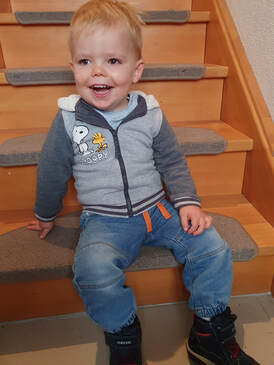
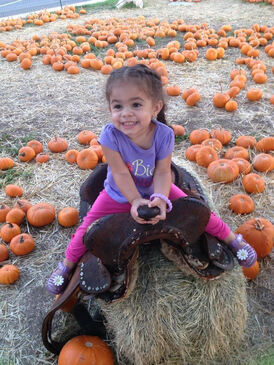
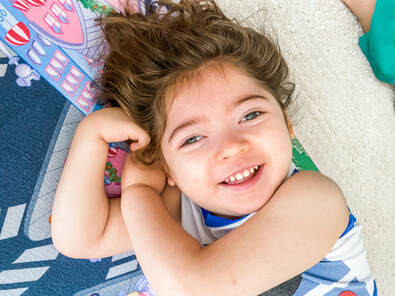
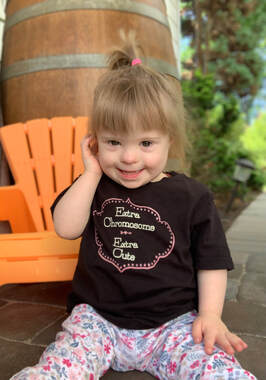
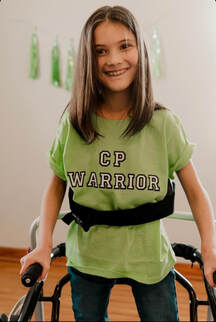
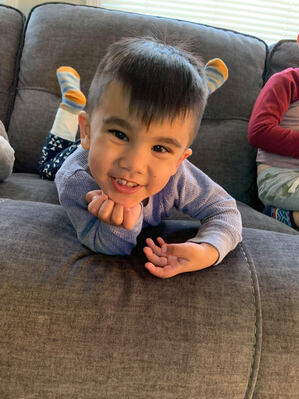
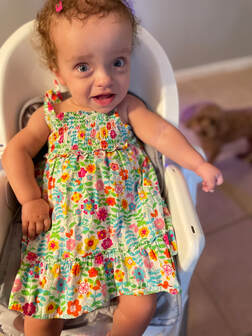
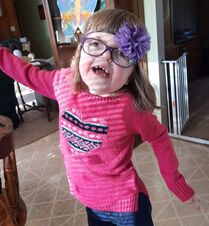
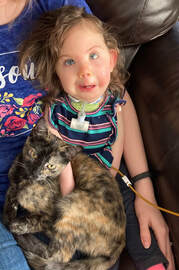
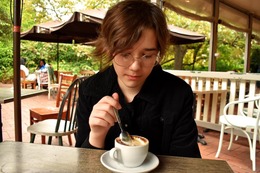
 RSS Feed
RSS Feed
